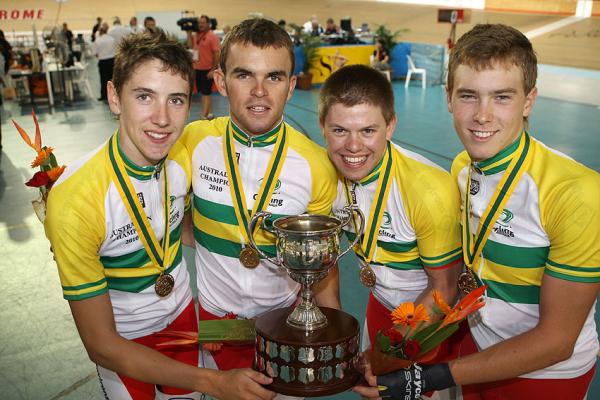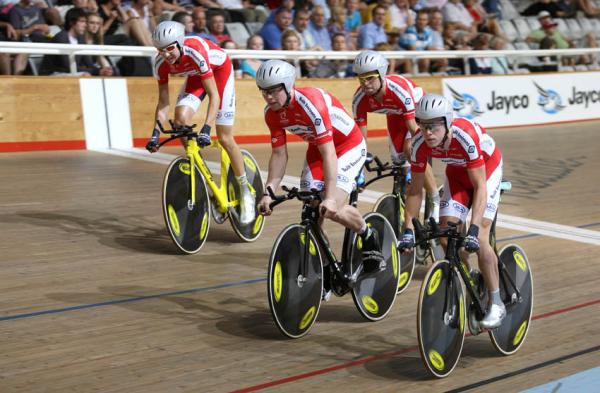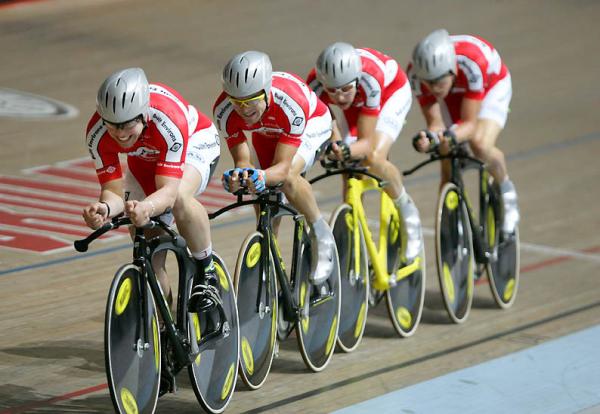Pursuit experiment works wonders at Nationals
Addition of Glasspool sets new precedent for endurance event



South Australia's performance in the men's team pursuit at the Australian Track Nationals last night was significant for a couple of reasons, not least of all because of an experiment that could change the face of the discipline.
The squad led by Tim Decker included a 1km time trial 'specialist', James Glasspool (pictured second from right, inset) who joined U23 road time trial world champion Jack Bobridge, Rohan Dennis and junior individual pursuit world record holder Dale Parker to record a time of 4:00.417.
The idea yielded a new Australian record and could signal a revolution in the methods employed to attack the event, with the attributes of kilo riders brought to a race where traditionally track endurance riders have excelled.
Kilo riders must be able to hold a high speed for four laps of a 250m track; add this type of athlete to a four-man effort and the effect could be stunning, as was last night's performance.
Glasspool explained his role in the team was to provide a 'rolling platform' at second wheel, ensuring Bobridge launched his turn in the team's effort at top speed. Glasspool's pace over a kilometre was crucial to establishing the quartet on a fast schedule.
"I did three-and-a-quarter laps; Rohan [Dennis] did one-and-a-quarter laps [at the start] then I did almost three-and-a-half," said Glasspool. "Rohan pretty much got us all up to speed - I just had to hold it a little bit and then increase in slight amounts.
"I held that for two laps, and Jack had said to me before the ride that when I saw Tim [Decker], for the next three quarters of a lap just increase the pace and it will be like a motorbike, basically giving him a really good slingshot,"
Get The Leadout Newsletter
The latest race content, interviews, features, reviews and expert buying guides, direct to your inbox!
And that's how it eventuated, with Bobridge unleashing his fury after Glasspool had set up the move, with Parker and Dennis supporting him to the finish. The plan had worked, and Glasspool told Cyclingnews how the idea had originally fallen into his grasp.
"At the Tasmanian Christmas Carnivals Tim [Decker, South Australian Sports Institute head cycling coach] approached me and told me that he had Jack, Rohan and Dale for the team pursuit and he wanted me to do the start.
"He told me that he wanted me to do the first kilometre on the front; the original plan was to have me as the first rider, ride a tempo first lap to allow the other guys to get on and then just build them up over the next four laps.
"When we came back from Tassie we were toying around with a few different ways of doing things, such as riding 90 percent for the first half lap and trying to be as accurate as we could. We started to think about it and said, 'Well, my lactate tolerance wasn't as great at that point, so we possibly needed to have a look at a few other ways of doing it - maybe have me do three laps'.
"We ended up running with the second wheel idea - that way I wasn't going to start too hard and they were going to be slightly out of their comfort zone [at the beginning] and it was really just a matter of hanging on and getting the best start we could."
Apparently the idea started life with the Great Britain coaching staff but it was an Australian quartet that executed it in competition, with a national record the result.
Glasspool admitted that he felt a few nerves but after qualifying for the gold medal riding against the Western Australian quartet of Cameron and Travis Meyer, Luke Durbridge and Michael Freiburg.
"I was probably more nervous the night before and the day of the ride. For about two hours after I got to the track [before qualifying] I was just walking around and using a lot of energy... trying to sort out different length cranks [he used 172.5mm cranks instead of his normal 170mm ones - Ed.], bottom brackets and all sorts of things and not concentrating on what I needed to do," he said.
"Once we did the qualifying round and I didn't stuff the guys up - all the guys came off and said I did a really good job - I was a lot more relaxed and not worried about it. When I rocked up to the track before the final I was relaxed, had a good warm up - it was a lot better."